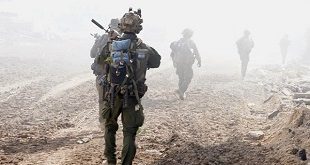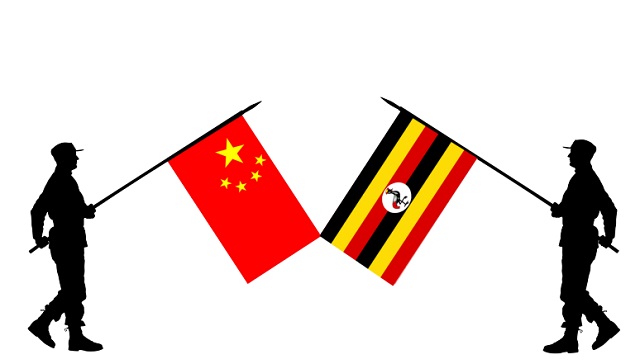
New report shows influence on Museveni, Muhoozi
COVER STORY | IAN KATUSIIME | The literature produced and used by the National Resistance Army (NRA), President Yoweri Museveni’s guerilla army that fought in the Luweero bushes from 1981-1986 called its mission a “protracted people’s war.”
The doctrine of “people’s war”, sometimes called “protracted people’s war,” guided the vast majority of Africa’s guerrilla movements, including those that sided with the Soviet Union after the Sino-Soviet split of 1960.
A new report notes that the above terminology, which was seen as a cheap but effective blueprint for waging war, was part of a larger political context and ideological framework of Chinese professional military education (PME) that China used to influence the organisational development of African guerrilla armies at the time.
The report entitled `Chinese Professional Military Education for Africa: Key Influence and Strategy’ says the “protracted people’s war” ideology extends to movements now in power in Eritrea, Rwanda, South Sudan, and Uganda.
“African fighters called it “poor man’s war,” says the report by Paul Nantulya, a renowned researcher on China-Africa relations at the Africa Centre for Strategic Studies in Washington D.C, U.S. The report was commissioned by the U.S. Institute for Peace, a U.S. think tank and released this July.
Findings of the study manifested the different ways of the impact of Chinese military education on African leaders today.
“It can foster and strengthen ties to China among not only military personnel but also policymakers. In many African countries, the defense establishment has a close relationship with one or more Chinese schools based on deep benches of Chinese-trained alumni in influential positions in the country’s defense hierarchy.”
Examples of such relationships include Tanzania and the Dalian Naval Academy, Ethiopia and the PLA NDU, Mozambique and the Army Command College, and Uganda and Shijiazhuang Tiedao University—the forerunner of the PLA’s Railway Engineering Institute.
“These affiliations afford the PLA an opportunity to shape military doctrine and concepts and to nurture personal ties.”
The report shows the growing influence of China on Uganda’s military. It stated that several Ugandan commanders have studied at PLA Army Command College in Nanjing which oversees China’s International Military Education Exchange Center. It is the school with the highest number of African students.
Part of its alumni is Maj. Gen. (Rtd) Nathan Mugisha who was Force Commander of African Union Mission in Somalia (AMISOM) from 2009-2011 and is currently Uganda’s deputy ambassador to Somalia.
Gen. David Muhoozi, former Chief of Defence Forces and currently state minister of internal affairs, attended the PLA National Defence University which “receives an annual in-take of several hundred African officers.” Muhoozi has also served in the positions of UPDF Joint Chief of Staff and Commander of Land Forces.
Gen. Muhoozi and China
In his report, Nantulya references a book titled `Battles of the Ugandan Resistance: A Tradition of Maneuver ‘ written by Gen. Muhoozi Kainerugaba, President Museveni’s son, who has shown admiration for Chinese orthodoxy and its founding father Mao Zedong.
“Whenever (Ugandan president Yoweri Museveni) was wracked by doubt, he returned to Mao Zedong orthodoxy. . . . There were remarkable similarities [in Mao’s and Museveni’s circumstances], so it was patently obvious to Museveni that of all the theorists of war, Mao was the most compelling and relevant,” Muhoozi wrote on pages 36 and 41.
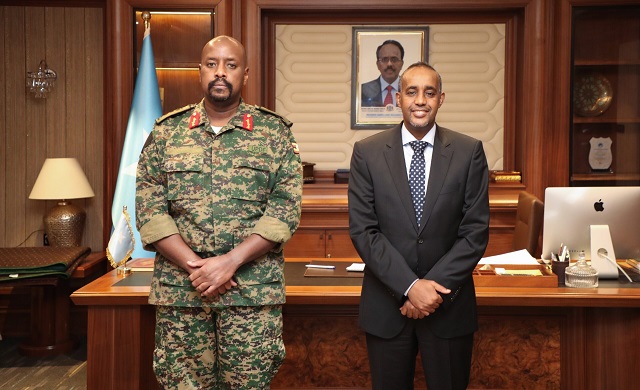
In a picture Muhoozi tweeted on Feb. 10, 2022, the ex-commander of UPDF Land Forces said he had attended a course in China in the past. “Me in China 27 years ago! On a course. I think South Eastern Asians are the most intelligent human beings on earth. The way they think about everything is fascinating!”
According to Muhoozi’s tweets, he visited Hunan Province, the birth place of Mao in 1995. Muhoozi joined the army in 1999 but it appears that the course he tweeted about was military-related.
Like his son, Museveni has also been a great adherent of Chinese ideology constantly referencing Mao, and Deng Xiaoping; one of Mao’s successors, in his speeches and writings.
Although Muhoozi did not go for other courses in China once he was a commissioned officer in the UPDF, he went on to occupy key positions in the Ugandan army; from heading the Special Forces Command (SFC) to his most recent 14-month stint as commander of the UPDF Land Forces.
In March 2021, Muhoozi then commandant of SFC, announced that the elite unit was working with Poly Technologies, a Chinese military contractor which manufactures CS/VP3 Armoured Personnel Carriers (APCs). Muhoozi met with four officials from Poly Technologies at the SFC headquarters in Entebbe alongside other SFC officers.
A source at the Ministry of Defence said a number of the APCs were later stationed on an island in Kalangala for exhibit purposes as the contract between Poly Technologies and UPDF kicked into gear.
The contract at the time between the UPDF and Poly Technologies was initially meant to cover a seven year period but it was scaled down to three years. Uganda has also worked with Norinco, a Chinese-state owned defense contractor, and one of the largest in the world.
From Norinco, Uganda acquired VN2Cs, infantry fighting vehicles, that were displayed at a ceremony where President Museveni passed out 543 graduates who had successfully completed the Armoured Crew Course Level 3, at the Armoured Warfare Training School (AWTS) in Karama, Mubende in November 2021.
In a bid to promote its governance models on the African continent, China has for the last fifteen years been conducting PME among African army officers. The aim is for China to develop closer relationships with African governments and militaries and to build a shared understanding of security.
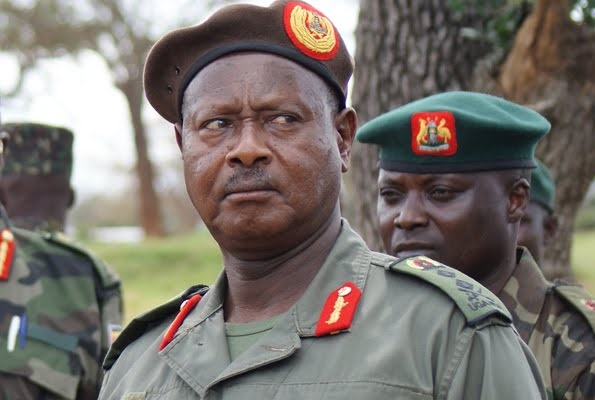
Top Ugandan Generals who have key roles in the army leadership and served in strategic positions abroad have been some of the beneficiaries of this training.
Nantulya’s report says, to buttress its already vast economic footprint in several African countries, the Chinese government through its army; the People’s Liberation Army (PLA), has offered opportunities to army officers in Africa to attend training programs and participate in dialogues and exchanges with their Chinese counterparts.
PME describes “the professional training and education of military personnel, typically conducted at universities, academies, schools, and similar institutions.” Africa has received significant attention from China in this regard.
“Between 2008 and 2016, for instance, China conducted 294 military engagements in 40 African countries. Of those, no fewer than 259 were leadership visits and exchanges, guided tours of PLA facilities, and dialogues reflecting China’s emphasis on the political uses of military power,” the report noted. “Only 22 engagements were naval port calls, and 13 were military exercises.”
The report begins by describing the PLA’s support for African independence movements during the decolonisation period and then examines recent trends in Chinese PME, focusing on the training African officers receive in China. Next, the report sketches the larger political context and ideological framework within which Chinese PME functions.
Nantulya writes that “The PLA trained at least one movement in nearly every African territory that fought for independence. However, its deployments were modest. China sent 3,418 military experts to Africa between 1965 and 1980. Overall, 17,000 African guerillas received Chinese training in Africa and 3,022 in China.”
He notes however that Cuba and Soviet Union made far greater commitments through establishment of bases, supply of weaponry and actively took part in combat operations.
However the PLA prioritised “military political work” (PLA’s role in accomplishing political and ideological goals) over military commitments and displays of military power.
“It trained guerillas in China and systematically exposed them to China’s society and political system. From the 1960s through the early 1990s, PLA trainers were stationed in countries that hosted liberation movements, including Algeria, Egypt, Ghana, Tanzania, Zaire, Zambia, and Zimbabwe”
The PLA also influenced the organisational development of the groups it trained.
Thami Ka Plaatjie, a veteran of the Azania People’s Liberation Army (APLA), the armed wing of the Pan Africanist Congress, and currently a senior advisor in the South African government, noted, “It is clear that the structure of the APLA was based closely on that of the Chinese PLA. The high command included a commander, chief political commissar, chief of staff, functional directors, and regional commanders.”
The NRA led by Museveni adopted a similar structure while waging its guerilla war and maintained it after it captured power in 1986. The report states that the same structure was used by the African National Congress (ANC), South Africa’s ruling party, and the liberation movements of Algeria, Angola, Guinea-Bissau, Mozambique, Namibia, and Zimbabwe, among others.
For the PLA Command College, the report notes; “It includes among its African alumni 10 chiefs of defense; eight defense ministers; the former presidents of the Democratic Republic of the Congo (Laurent Kabila), Guinea-Bissau (João Bernardo Viera), Namibia (Sam Nujoma), and Tanzania (Jakaya Kikwete); and the current presidents of Eritrea (Isaias Afewerki) and Zimbabwe (Emmerson Mnangagwa).”
Accordingly, Mozambique’s president Filipe Nyusi visited this college in May 2016 to thank its directing staff for training his Mozambique Liberation Front (FRELIMO). “Nyusi also visited Nanjing itself, which has a large Mozambican community and plays host to the China Mozambique Business Forum. By 2016, 94 Mozambicans had graduated from this college, including the longest-serving army chief, General Lagos Lidimo.”
Other schools that have been popular with African officers include the 4th Department of Military College (Nanjing), the 4th Department of Higher Military College (Beijing), and the Foreign Training Department of the College for Defense Studies (Beijing) according to the study.
“In 2017, they were merged into the PLA International College for Defense Studies (ICDS), which the PLA markets heavily to African countries. Sometimes close to half of its students are from Africa, as was the case in 2017, when 60 of 134 students were African.”
Joseph Kabila, former president of the Democratic Republic of Congo, attended the PLA NDU. This school is popular with Ethiopian officers and beginning in 2015, Ethiopian senior officers slated to become generals have attended a graduate-level “Ethiopian Senior Leaders Course” at China’s NDU as a “finishing course,” though the practice was interrupted by the COVID-19 pandemic.”
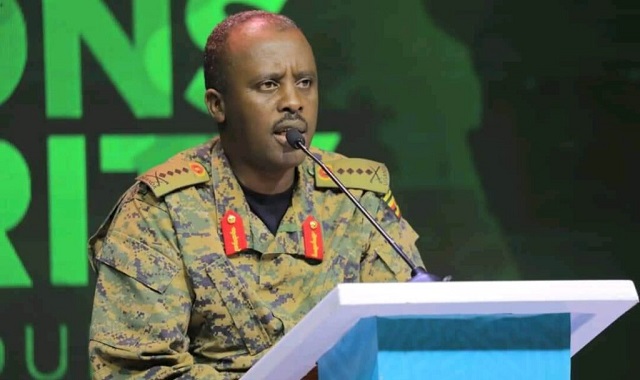
From the report, Colonel Ngwah Abdoulaye Kenyiveh of Cameroon spoke about the impact of the course he took at the ICDS, “It gave me a clear insight into the economic metamorphosis of the People’s Republic of China, and a broad view of international and national security issues.”
Other long-standing PME destinations in China for African officers include the PLA Army Infantry College, the PLA Academy of Armored Forces, and the Dalian Naval Academy, which has trained Tanzanian officers annually since 1965.
“The People’s Armed Police, which has become increasingly active in Africa’s security sector, was placed under the control of the Central Military Commission in 2017, and thus its academies qualify as part of China’s system of military education and training,” the study points out.
According to the Chinese government, 2,000 African police and paramilitary personnel have attended various police academies, including the Police Command College in Hebei Province and the People’s Public Security University in Beijing.
“Over the same period, 500 officers from 16 African countries have graduated from the PLA Naval Medical University.” It adds that China’s Peacekeeping Training Center in Huairou District in Beijing has also become increasingly popular with African students.
“African countries are keen to develop and deploy peacekeepers, and China is well-placed to help. China contributes more peacekeepers to international missions than the other permanent members of the UN Security Council combined, and over 80 percent serve in Africa.”
Political ecosystem
The report underscores the political eco system in which the training of African military officers happens. “The year 2023 marks the 33rd consecutive year that a Chinese foreign minister visited five or six African countries in early January as China’s first diplomatic activity of the year.”
Since the end of the Cold War, every Chinese foreign minister has made at least 50 state visits to Africa during his 10-year tenure a higher rate of visits than any foreign minister from China’s great power competitors, the study observed.
“Overall, the frequency of China’s exchanges has been breathtaking. Between 2008 and 2018, China’s top leaders visited Africa 79 times, while African leaders visited China 222 times. The premier, customarily the second-ranked official on the CPC’s Politburo Standing Committee, China’s highest leadership body, oversees FOCAC’s 36 implementing agencies.”
FOCAC is Forum for China-Africa Cooperation; a multilateral organisation that is the leading platform for cooperation between China and the continent that has also engendered military ties.
A West African officer interviewed for the research called this “the larger political ecosystem in which military ties are built.” “When you sit in the general headquarters and see this flurry of political, social, cultural, and educational engagements, you reach the conclusion that China should be treated as a priority, even a preferred partner,” he wrote.
“This is the FOCAC ecosystem. It is very impactful on the impressions we form about China as officers in uniform. Engagements with the West on these levels are not as intense, regular, or high-level.”
 The Independent Uganda: You get the Truth we Pay the Price
The Independent Uganda: You get the Truth we Pay the Price



